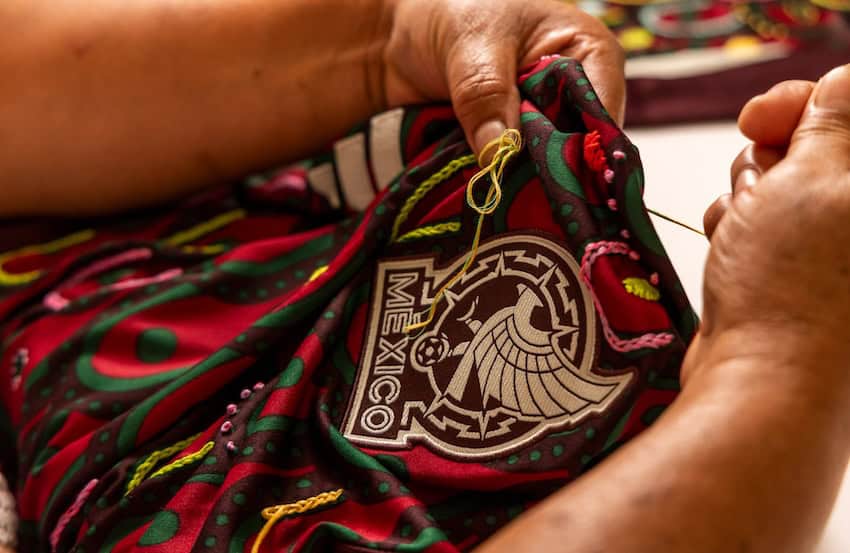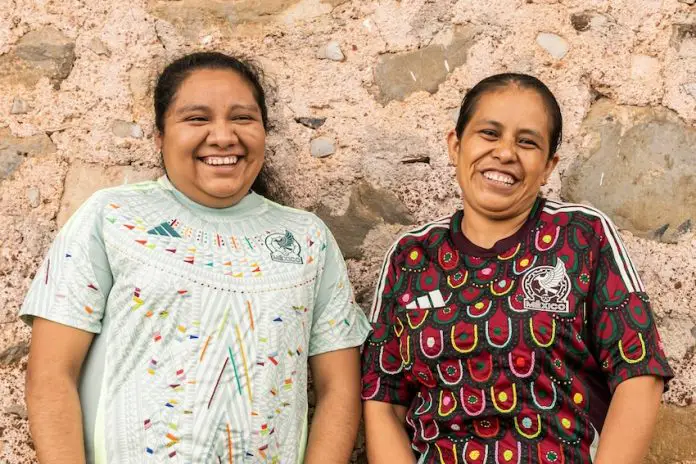The ever-burning question that sits atop the mind of any creative these days is this: Is artificial intelligence a friend or foe?
For Antonio Nuño, CEO and co-founder of Someone Somewhere, AI is more than a friend. It’s a best friend. Without it, he may not have landed the once-in-a-lifetime partnership that most creators only dream of – designing the home and away jerseys for the Mexican National football team. What’s more, the jerseys would be released during Copa America, football’s second most-coveted tournament after the FIFA World Cup.

Using AI-generated imagery, Nuño and his design team came up with two prototype jerseys for the potential use of Mexico’s National football team. Each jersey showcased over 100 meters of colorful embroidery that would, in theory, be applied by female artisans based in Naupan, Puebla. As soon as the team let the image of these jerseys loose on the internet, it went viral, hitting over 1 million views and reaching the far depths of the sports world.
The next day, Adidas called. A call that’s surely any fashion designer’s dream come true.
Employees from Adidas Mexico didn’t just see the video, they saw the interest it generated. They wanted to collaborate on a special collection of jerseys to celebrate Mexico’s participation in Copa America
In order to do so, Someone Somewhere invited several of its most talented embroiderers to participate in the project, including Cata and Cristina. Both ladies reside in Sierra Norte de Puebla and learned their craft at a young age through their mothers, grandmothers, and cousins.
Decorating the jerseys was no simple task – the artists dedicated 11 hours of their time to hand-embroider each and every jersey, a symbol of the 11 players representing Mexico at the Copa America.
“I’m proud to embroider the jerseys for Mexico’s National football team. When I told my family, they didn’t believe me. It’s an important job,” Cris told Fox Sports Mexico.
“It’s incredible to know that the Mexico National football team’s jerseys have a bit of our tradition, so the world can know what we’re capable of. We realized we have the ability to accomplish what we set out to do,” said Cata.
According to Periódico Central, the regions of La Sierra Negra and Sierra Norte are the poorest in Puebla State, with half to 92.3% of inhabitants living in extreme poverty. This means lack of critical access to social security, public transportation, viable infrastructure, and basic housing, education, and jobs. Artisanship is often the only way to make money and find purpose. And with many artisans living in such remote villages with unreliable transportation, it can be hard to reach the right customer base.
View this post on Instagram
For those artisans that do leave to earn minimal wages as street vendors, they’re often faced with dirty and sewage-ridden working conditions. They’re not afforded the luxury to skip a day of sales, even during heavy rain or extreme heat. To top it off, local governments in cities such as Mexico City and Guadalajara are known for imposing strict regulations on street vendors that, when broken, often result in hefty fines or confiscation of their products.
Which is why these special edition jerseys are so much more than just football. The project serves as a powerful platform to enable Mexican artisans to display their talent in front of an international audience.
It’s not bad PR for Someone Somewhere, either, whose mission is “to lift millions of artisans and industrial workers out of poverty, while taking care of our planet”. The Mexico City-based fashion brand currently works with over 200 artisans in the mountains of Puebla, each of whom is listed on their website, along with a short bio and personal contact information.
Moreover, the company is committed to engaging in only the most ethical and sustainable practices, utilizing recycled fabrics and incorporating technology where applicable to enhance the production process. According to their 2023 sustainability report, Someone Somewhere generated more than 700,000 hours of work for artisans, upscaled more than 90,000 kgs of textile waste, and mitigated 4,000 tons of CO2 emissions.
A little reminder that perhaps AI isn’t so bad, after all.
Bethany Platanella is a travel planner and lifestyle writer based in Mexico City. She lives for the dopamine hit that comes directly after booking a plane ticket, exploring local markets, practicing yoga and munching on fresh tortillas. Sign up to receive her Sunday Love Letters to your inbox, peruse her blog, or follow her on Instagram.
